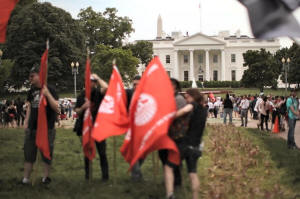|
Trump administration sides with employers
in Supreme Court labor case
 Send a link to a friend
Send a link to a friend
 [June 17, 2017]
By Lawrence Hurley [June 17, 2017]
By Lawrence Hurley
WASHINGTON (Reuters) - The Trump
administration on Friday sided with employers in a Supreme Court case
over the rights of workers to bring class action lawsuits against
companies, court documents showed.
Reversing a position staked out earlier by the Obama administration,
which backed employees, the administration said in a court filing it
would no longer defend the position of the National Labor Relations
Board (NLRB) that employment agreements requiring workers to waive their
rights to bring class action claims are invalid.
The waivers compel workers to individually arbitrate disputes with their
employers rather than bring collective lawsuits with their co-workers.
The NLRB, an independent agency in the federal government, said in
letter to the court on Thursday that its own lawyer would represent the
board in the employees' class action rights case.
It is unusual for the government to change positions in a case already
pending at the Supreme Court, and marks a sharp break from the
administration of former President Barack Obama, a Democrat, which had
originally pursued the case on behalf of the NLRB.

The NLRB currently has a Democratic majority, isolating it politically
from the Republican Trump administration.
In January the Supreme Court agreed to review three lower court rulings,
including one involving global professional services firm Ernst & Young,
over the legality of the waivers. Employers have increasingly required
workers to sign them as part of their arbitration agreements to guard
against the rising tide of worker lawsuits seeking unpaid wages.
In Friday's court filing, acting U.S. Solicitor General Jeffrey Wall
said the Supreme Court should find that class action waivers are legal
and enforceable under federal law. Workers that waive the right to
collective litigation cannot "escape the consequences of that choice,"
he said.
[to top of second column] |

People attend a
demonstration on International Labor Day at Lafayette Park outside
the White House in Washington D.C., U.S. May 1, 2017. REUTERS/Carlos
Barria

Companies say the waivers allow for speedier and more cost-effective
resolution of workplace disputes. Class action litigation, on the
other hand, is harder to fight and can lead to large damages awards.
Workers argue that pursuing their cases individually is
prohibitively expensive and, without the prospect of large damages
awards that class action litigation can lead to, lawyers will be
deterred from taking their cases.
The nine Supreme Court justices are expected to issue a ruling on
the issue in the courtís next term, which starts in October and ends
in June 2018.
(Reporting by Alison Frankel, Robert Iafolla, Andrew Chung and
Lawrence Hurley; Editing by Tom Brown)
[© 2017 Thomson Reuters. All rights
reserved.]
Copyright 2017 Reuters. All rights reserved. This material may not be published,
broadcast, rewritten or redistributed.
 |